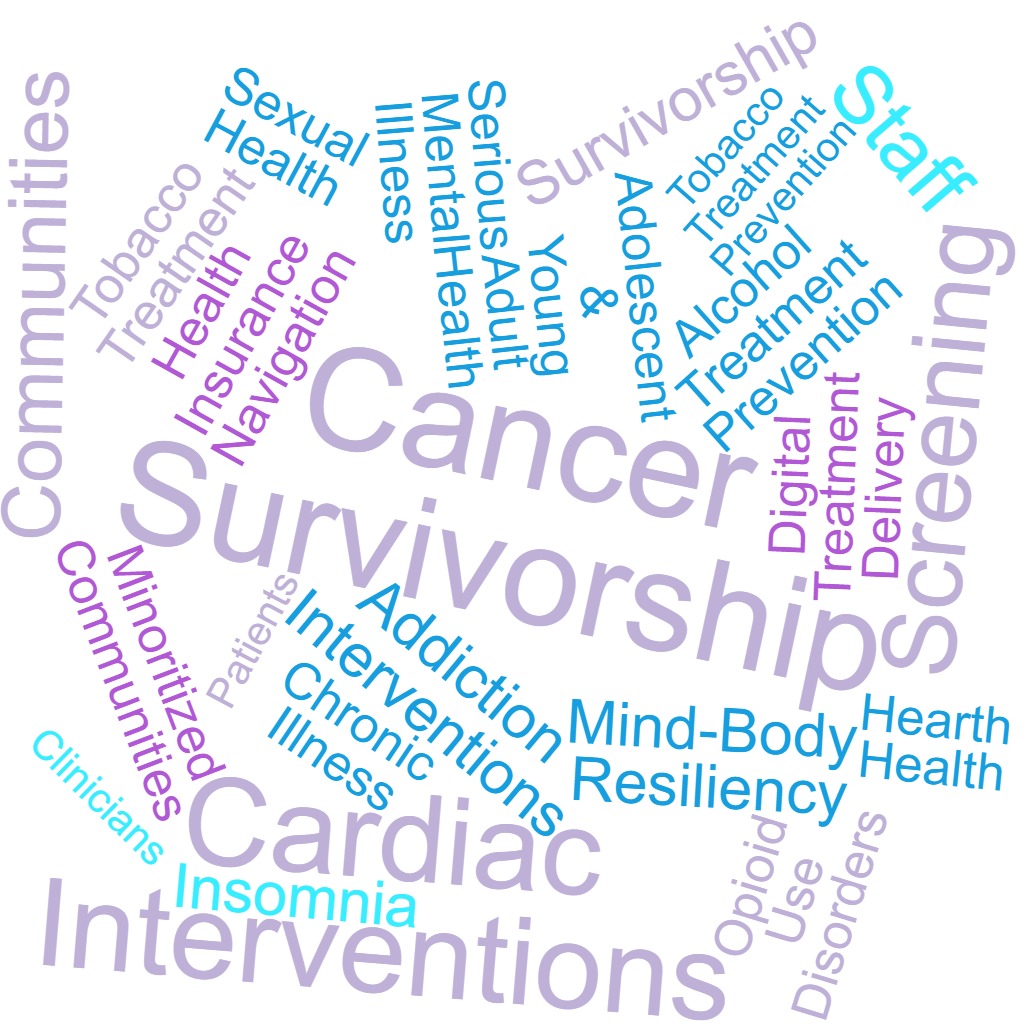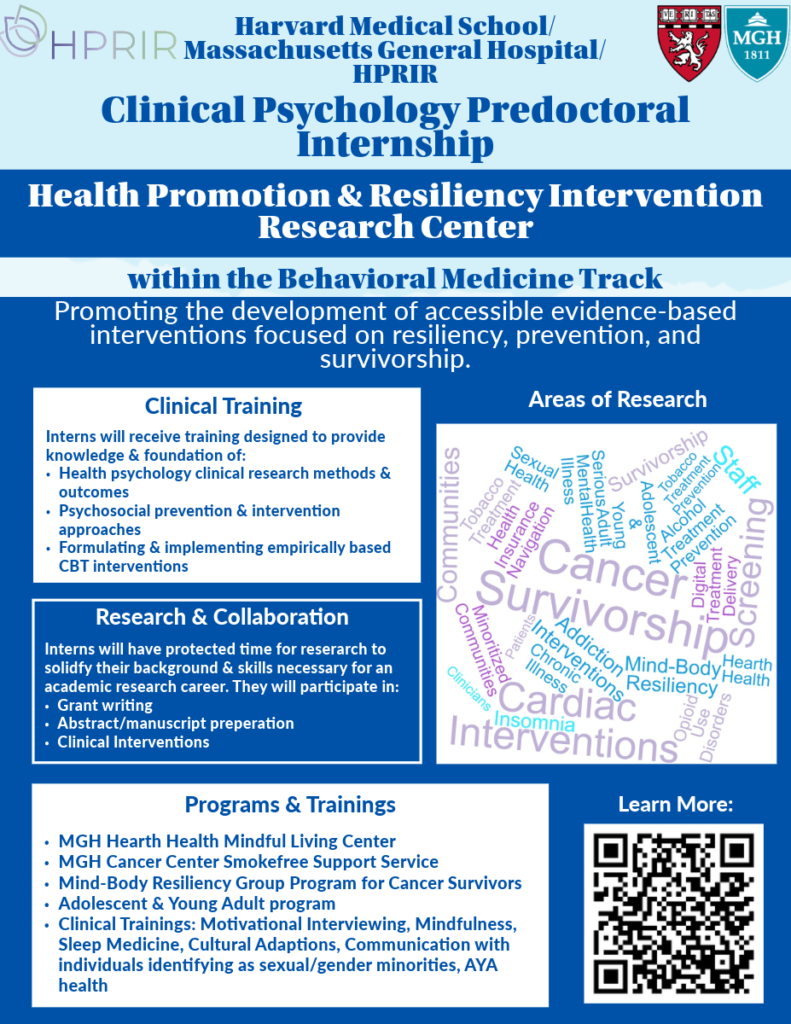*This is effective for the academic year 2025-2026*
Within the Behavioral Medicine internship track, the HPRIR track is an opportunity for an intern to specialize and expand their training in health promotion (e.g., cancer screening, tobacco treatment, physical activity) and resiliency (mind-body, integrative medicine) research through additional clinical and clinical research-related electives. The core of the experience takes place in the MGH Mongan Institute, where interns will have the opportunity to collaborate with multidisciplinary clinicians, clinical researchers, and health policy experts. Interns will gain experience with a variety of populations of individuals with chronic illnesses, caregivers, providers, healthcare systems and community populations.

Training Aims
(1) Train clinicians in resiliency and behavioral intervention research
(2) Prioritize training in health equities and disparities research
(3) Increase the diversity of clinical researchers trained in resiliency and behavioral intervention research
(4) Promulgate training in evidence-based mixed methods (qualitative and quantitative) research
Goals
(1) Provide interns with supervised clinical training in evidence-based treatments (positive psychology, cognitive behavioral therapy, relaxation skills, mindfulness, problem-solving and emotion-focused coping skills, and risk and stage-based motivational interviewing)
(2) Develop interns’ abilities to treat patients as part of a multidisciplinary care team
(3) Provide an opportunity for interns to formulate and execute treatment plans
(4) Be a part of a multidisciplinary team of clinical researchers whose clinical work informs their research. Interns will see patients with chronic medical conditions and psychosocial stressors, direct individual and group supervision, resiliency training and clinical supervision, and opportunities to participate in departmental and hospital-wide seminars and lectures on health equity, implementation science, primary care, substance use, tobacco use, oncology, mixed methods research, palliative care, nursing, grant writing, and health policy.
Internship Components
+Clinical Training
Interns will have opportunities to see patients referred to the the Behavioral Medicine and Psychiatric Oncology clinics. Interns will have opportunities to participate as interventionists on several NIH-, foundation-, and internally funded randomized clinical trials, at the pilot, efficacy and effectiveness stages of research as well as national datasets and observational studies. Interns will receive training designed to provide knowledge and foundation of health psychology clinical research methods and outcomes, psychosocial prevention and intervention approaches, formulating and implementing empirically based CBT interventions
Clinical Services:
- Cancer Survivorship Groups (SMART-3RP): Co-lead this 9-session group-based mind-body program for cancer survivors which integrates relaxation training with cognitive-behavioral therapy and positive psychology principles. Special interest groups will also be available, including mind body groups for adolescent and young adult survivors.
- MGH Cancer Center Smokefree Support Service: MGH Cancer Center service that provides individual tobacco treatment counseling to patients who have been diagnosed and treated with cancer. The SSS treatment protocol integrates cognitive behavioral therapy, mind-body techniques, and motivational interviewing.
- VHL Resiliency: Lead/co-lead a resiliency program for patients diagnosed with Von Hippel-Lindau Disease, a rare genetic disease that predisposes individuals to develop multiple tumors (malignant and benign) throughout their bodies at any point in their life.
- Sickle Cell disease: Assist with leading a mind body program integrated into the care of patients diagnosed with sickle cell disease.
- Collaborative Care and Community Engagement Program: Participate in a collaborative care model focused on serious mental illness and cancer including engagement of patients with cancer and preexisting serious mental illness in hospital, outpatient, and community settings to gain expertise in cognitive behavioral therapy for psychosis, motivational interviewing, person-centered care, and collaborating with social work, psychiatry, and navigation.
- Pulmonary Nodule Clinic Smoking Cessation Service: Deliver evidence-based tobacco treatment (based on SSS2) to patients who are undergoing screening at the MGH Pulmonary Nodule Clinic. This tobacco treatment is delivered virtually and in conjunction with thoracic, primary care, and radiology treatment teams.
- MGH Heart Health Mindful Living Center: Deliver evidence-based individual and group mindfulness-based CBT interventions for women with co-occurring cardiovascular disease and emotional problems. All treatment is delivered via telehealth and psychologists interact closely with the cardiology team. *Potential opportunities for secondary data analysis
Interventionist Opportunities:
- Caregiver R21: Deliver an evidence-based mind-body resiliency group intervention (SMART-3RP) to caregiver (partner/family member/friend) and cancer survivor dyads via a telehealth platform. The study will assess whether the intervention effects on caregiver and survivor resiliency are interdependent and identify characteristics associated with intervention effectiveness, as well as explore the intervention effects on caregivers’ and survivors’ health care utilization.
- Prevalence and Patterns of Vaping Nicotine and Cannabis by Patients with Opioid Use Disorder and Tobacco Use in Substance Use Disorder Peer Recovery: Assist with mixed-methods cross-sectional survey studies to examine vaping and cigarette smoking behaviors and attitudes among adults with OUD in buprenorphine treatment as well as among SUD peer recovery coaches.
- Assessing the Effect of Virtual Navigation to Improve Health Insurance Literacy and Decrease Financial Burden: A CSS Randomized Trial / HINT II: Deliver the Health Insurance Navigation Tools psychoeducational program to colorectal cancer survivors (HINT C Study) or to childhood cancer survivors (HINT II Study). The program involves 5 virtually-delivered sessions that teach health insurance literacy, patient advocacy, and current legislation related to health care access (i.e., Affordable Care Act) in an attempt to increase health insurance literacy and decrease financial burden for patients.
- Transitions Study: Deliver a 5-session coping skills intervention to assist patients with lung cancer in transitioning from curative treatment to survivorship. The intervention integrates problem-focused and emotion-focused coping strategies.
- Pathways Study: Deliver a psychosocial intervention to support patients with rectal cancer who are initiating an intensive course of treatment. The intervention combines medical information with strategies for maintaining quality of life.
- Mindfulness-Based Cognitive Therapy Delivered via Group Videoconferencing for Acute Coronary Syndrome Patients with Depressive Symptoms: Deliver an 8-week MBCT or health enhancement program focused on targeting depression and promoting cardiac health behaviors to patients after acute coronary syndrome (e.g., myocardial infraction or unstable angina, “a heart attack”).
- Innovating CBT-I for Cancer Survivors: An Optimization Trial: A 2-year study aiming to conduct a randomized controlled trial evaluating the Survivorship Sleep Program delivered in four different ways (individual sessions + booster sessions, individual sessions + no booster sessions, group sessions + booster sessions, or group sessions + no booster sessions) among 80 cancer survivors with insomnia. Additionally, we will be enrolling a majority (>50%) racial and/or ethnic minority cancer survivors.
- Efficacy of Synchronous, Virtual Cognitive Behavioral Therapy for Insomnia across Phases of Cancer Survivorship: A 4-year study aiming to conduct a randomized controlled trial evaluating the Survivorship Sleep Program compared to enhanced usual care among 198 cancer survivors with insomnia. Enrolled individuals will either have competed primary cancer treatment, in active cancer treatment, and those living with metastatic cancer and not in treatment.
+Didactics and Supervision
Clinical work will be supplemented by several supervisions, meetings, and didactics. First, interns will receive weekly individual supervision from a licensed clinical psychologist in HPRIR and weekly group supervision with fellow Behavioral Medicine interns in the general Behavioral Medicine and Psychiatric Oncology tracks as well as the HPRIR track. Second, interns will participate in the weekly HPRIR meetings in clinical research and resiliency research. Attended by both psychologists, physicians, nurses, health service researchers and psychiatrists, this meeting offers and discuss clinical research and clinical questions
+Research Faculty
Interns will have protected time for research to solidify their background and skills necessary for an academic research career. They will participate in grant writing, abstract/manuscript preparation, and clinical interventions. Opportunities for postdoctoral fellowship trainings will be available and supported.
Faculty accepting mentees:
Elyse Park, PhD, MPH (she/her): research has focused on understanding and improving health-related behaviors, especially smoking cessation among vulnerable medical populations. Her research interests extend across physician and patient behavior change, the role of culture on cancer preventive behaviors and resiliency among cancer patients and providers.
Lucy Finkelstein-Fox, PhD (she/her): research focused on sexual well-being in cancer survivorship and gender as a sociocultural variable predicting health outcomes. Specifically, interns may gain experience as study interventionists and qualitative interviewers or with data analysis and manuscript prep.
Daniel Hall, PhD (he/him): research has focused on Cognitive Behavioral Therapy for Insomnia (CBT-I) in different phases of cancer survivors. He explores interest in uncertainty, resiliency, and health behaviors among adults affected by cancer and the development and implementation of behavioral and mind-body interventions for managing these concerns.
Bettina Hoeppner (she/her): research has focused on using a positive psychology approach to develop and test a smartphone app for smoking cessation. She also works with recovery community centers to build strong relationships and conduct studies.
Christina Luberto, PhD (she/her): research has focused on the treatment of depression, anxiety, and/or stress in patients with cardiovascular disease. She explores feasibility of Mindfulness Based Cognitive Therapy (MBCT) delivered via group videoconferencing for patients with depression and cardiovascular disease, and fear of recurrence after a spontaneous coronary artery dissection (SCAD) event.
Rachel Millstein, PhD, MHS (she/her): focuses broadly on chronic disease prevention and management, and the intersection of emotions and health. She work’s on several interrelated aspects of behavioral medicine. She works on designing, delivering, and evaluating multilevel interventions to promote health behaviors, such as physical activity, healthy diet, mind-body interventions, and sleep among people with cancer, metabolic syndrome, cardiovascular diseases, diabetes, as well as military and veteran populations.
Rachel Rosen, PhD (she/her): research focused on smoking cessation among vulnerable psychiatric and medical populations, including adults with serious mental illness, substance use disorders, and/or cancer. Future work focused on developing, evaluating, and implementing behavioral and mind-body interventions to improve health outcomes among high-risk patients.
Joanna Streck, PhD (she/her): conducting a NIDA-funded clinical trial investigating whether switching individuals with OUD who smoke to e-cigarettes is a viable harm reduction strategy. She is working at the intersection of SUD and cancer and part of an effort to better understand oncology clinicians’ opinions about SUD assessment and referral for treatment.
HPRIR Predoctoral Alumni
| Daniel Hall, PhD | Lucy Finkelstein-Fox, PhD |
| Giselle Perez, PhD | Rachel Rosen, PhD |
| Christina Luberto, PhD | Leah Walsh, PhD |
| Joanna Streck, PhD |
